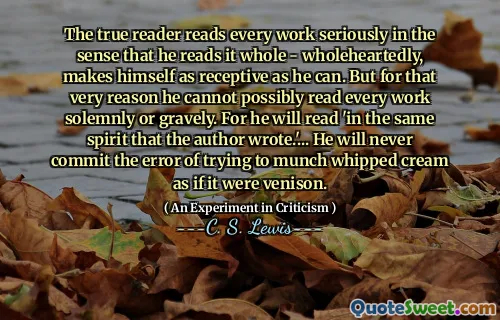"An Experiment in Criticism" by C.S. Lewis explores the nature of literary criticism and how readers interact with texts. Lewis challenges conventional views that prioritize the author's intent and historical context over the reader's experience. He argues that the value of literature lies in how it is perceived and enjoyed by its audience. By focusing on the reader's engagement, Lewis opens up a dialogue about the subjective nature of interpreting literature.
In the book, Lewis classifies readers into two categories: the "uncritical" and the "critical." He emphasizes that true appreciation of literature requires a critical approach, allowing readers to fully immerse themselves in the work. This engagement leads to a deeper understanding and enjoyment, contrasting with superficial or dismissive readings that overlook the text's richness.
Ultimately, Lewis advocates for an experimental approach to criticism, urging readers to analyze their own responses and emotions when engaging with a text. He believes that this introspection can enhance the reading experience and foster a deeper connection with literature, inviting readers to embrace their unique interpretations and insights.
More »
Today Birthdays
1955 -
Max Lucado
1946 -
John Piper
1842 -
William James
1907 -
Abraham Joshua Heschel
1887 -
Aldo Leopold
1755 -
Alexander Hamilton
1976 -
Alethea Kontis
1971 -
Mary J. Blige
1825 -
Bayard Taylor
1943 -
Jim Hightower
1885 -
Alice Paul
1923 -
Carroll Shelby
1928 -
David L. Wolper
1954 -
Kailash Satyarthi
1972 -
Amanda Peet
1946 -
Naomi Judd
1970 -
Malcolm D. Lee
1955 -
Christian Marclay
1973 -
Rahul Dravid
1987 -
Jamie Vardy
1942 -
Clarence Clemons
1992 -
Fatima Sana Shaikh
1948 -
Larry Harvey
1930 -
Rod Taylor
